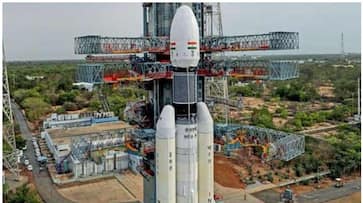Chandrayaan-2 was launched on June 22, after a failed attempt earlier. The successful launch of the moon mission has drawn accolades even from China. Foreign Ministry spokesperson of China Hua Chunying expressed congratulations to India.
Beijing: China on Tuesday congratulated India on the successful launch of the Chandrayaan-2 and expressed its desire to work with New Delhi for outer space exploration as both countries stepped up their space programmes including plans to build their own space stations.
"So, congratulations. We have noted the relevant reports and we welcome the successful launch of this probe by India," Foreign Ministry spokesperson Hua Chunying told a media briefing in response to a question.
India on Monday (June 22) successfully launched its second lunar mission Chandrayaan-2 on board its powerful rocket GSLV-MkIII-M1 from the spaceport in Sriharikota to explore the uncharted South Pole of the celestial body by landing a rover.
"The exploration of outer space, including the Moon, is the common cause of all human beings. They should contribute to the welfare of all people," she said.
"China is committed to the peaceful uses of outer space and we actively engaged in international communication and cooperation on the issue," she said, adding, "We would like to work with India for outer space exploration to deliver more benefits to mankind."
Hours after the launch on Monday, China's lunar exploration programme chief Wu Weiren wished India's Chandrayaan-2 a success and said China, which is actively pursuing its own moon mission, is not in competition with any other country in planning its space missions.
International efforts to explore the Moon - including made by India, Israel and the US - which is determined to send its astronauts back to the Moon within five years, will be pressuring and motivating China's lunar probe missions to further develop, Wu was quoted as saying by the state-run Global Times commenting on the successful launch of the Chandrayaan-2 into space.
"The international trend will not play a decisive role in China's planning on its lunar missions, and China is not going to compete with any one over the matter," Wu said.
Ruling out any competition with India, Wu said China's space projects have always been carried out in an independent and controllable fashion.
But at the same time Chinese space scientists kept a close watch on India's space programme specially after India successfully sent Mangalyaan probe to Mars in 2013, becoming the first country to achieve the complex feat.
In January this year, China's Chang'e-4 spacecraft scripted history when it made the first-ever soft landing on the far side of the moon. The rover Yutu-2 then rolled off the lander to explore its surroundings.
Last Updated Jul 24, 2019, 2:51 PM IST









![Salman Khan sets stage on fire for Anant Ambani, Radhika Merchant pre-wedding festivities [WATCH] ATG](https://static-gi.asianetnews.com/images/01hr1hh8y86gvb4kbqgnyhc0w0/whatsapp-image-2024-03-03-at-12-24-37-pm_100x60xt.jpg)
![Pregnant Deepika Padukone dances with Ranveer Singh at Anant Ambani, Radhika Merchant pre-wedding bash [WATCH] ATG](https://static-gi.asianetnews.com/images/01hr1ffyd3nzqzgm6ba0k87vr8/whatsapp-image-2024-03-03-at-11-45-35-am_100x60xt.jpg)


